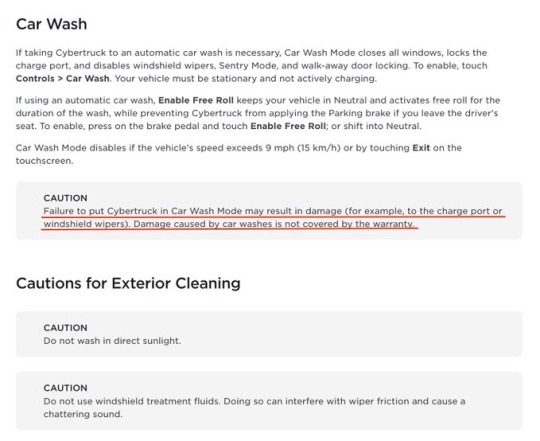Text
Shocking how many people don’t know that hens lay non-fertilized eggs and think the yolk they’re eating is a baby chicken
238K notes
·
View notes
Text
Obligation only flows one way: towards the category the speaker's part of.
I get how it's not actually paradoxical or surprising but it's eternally hilarious to me when the same people who say "But they're your FAMILY! You can't turn your back on the people who raised you!!!" also think it's a-ok to disown your children for the high crimes and misdemeanours of like. Smoking pot. Getting pregnant. Sucking dick.
668 notes
·
View notes
Text

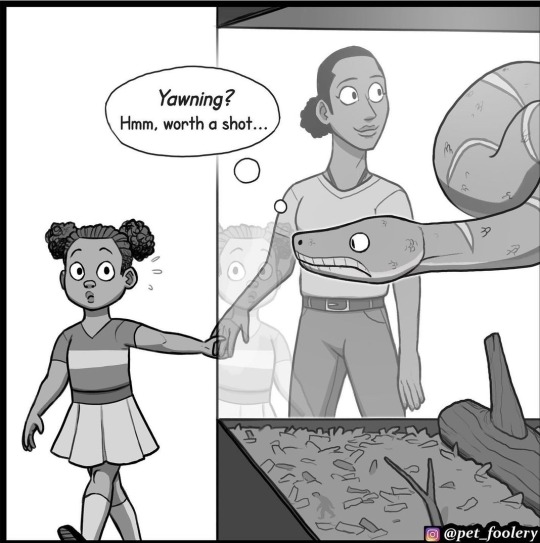




Comic by PetFoolery
Hands up if you'd also adopt that little noodle! ✋
271K notes
·
View notes
Text
My window is open. I overheard the following exchange:
Man: *calls an apartment number*
Woman: Who is it?
Man: Delivery!
Woman: Wheeee!
May we all be as happy with our deliveries.
6 notes
·
View notes
Text
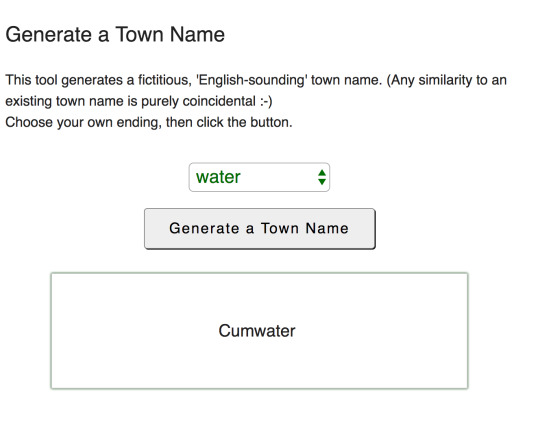
you know what i’ll use my own imagination for a while
128K notes
·
View notes
Text
I cannot express how jarring it was after being raised by a "Porn Addiction Coach" to get into a relationship with a woman and come face to face with the fact that she did actually want me to sexually desire her.
Like, in Evangelical Purity Culture, male desire was basically poison. It was a threat. It was this constant temptation that would destroy everything. And even after leaving, in the sort of queer, feminist spaces i spend most of my time in that wasn't something that pretty much anyone was spending time actively dissuading me from feeling.
But my desire is good. It's not something that I'm being accepted in spite of. It's a positive thing. It's a bonus. Not even just vanilla stuff, all the stuff I'd convinced myself were these weird terrible desires that were shameful to have.
It honestly took me over a decade to fully accept that. To stop dissociating during sex and confront that I was, in fact, being a massive perv and that was fantastic and preferable and that I could accept that into my self-image without shame or self hatred.
But it's important to do. It's important to leave relationships that don't welcome that part of you. To know that your sexuality is valuable and valid and worth owning and celebrating. Because the alternative is just...not being. Either existing as yourself and repressing the part of your identity that is sexual or allowing that sexuality to exist but turning off your self while it does.
17K notes
·
View notes
Text
107K notes
·
View notes
Text
The specific process by which Google enshittified its search
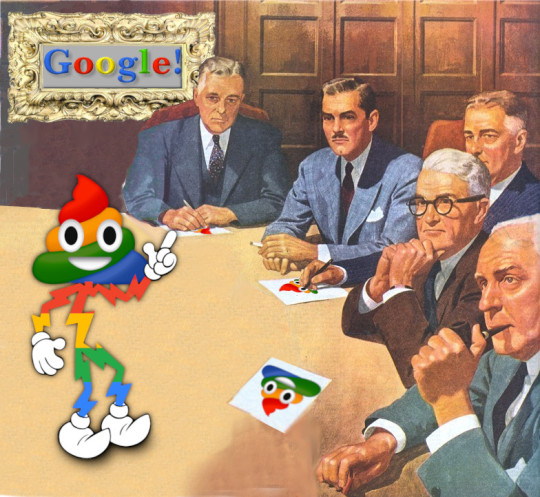
I'm touring my new, nationally bestselling novel The Bezzle! Catch me SATURDAY (Apr 27) in MARIN COUNTY, then Winnipeg (May 2), Calgary (May 3), Vancouver (May 4), and beyond!

All digital businesses have the technical capacity to enshittify: the ability to change the underlying functions of the business from moment to moment and user to user, allowing for the rapid transfer of value between business customers, end users and shareholders:
https://pluralistic.net/2023/02/19/twiddler/
If you'd like an essay-formatted version of this thread to read or share, here's a link to it on pluralistic.net, my surveillance-free, ad-free, tracker-free blog:
https://pluralistic.net/2024/04/24/naming-names/#prabhakar-raghavan
Which raises an important question: why do companies enshittify at a specific moment, after refraining from enshittifying before? After all, a company always has the potential to benefit by treating its business customers and end users worse, by giving them a worse deal. If you charge more for your product and pay your suppliers less, that leaves more money on the table for your investors.
Of course, it's not that simple. While cheating, price-gouging, and degrading your product can produce gains, these tactics also threaten losses. You might lose customers to a rival, or get punished by a regulator, or face mass resignations from your employees who really believe in your product.
Companies choose not to enshittify their products…until they choose to do so. One theory to explain this is that companies are engaged in a process of continuous assessment, gathering data about their competitive risks, their regulators' mettle, their employees' boldness. When these assessments indicate that the conditions are favorable to enshittification, the CEO walks over to the big "enshittification" lever on the wall and yanks it all the way to MAX.
Some companies have certainly done this – and paid the price. Think of Myspace or Yahoo: companies that made themselves worse by reducing quality and gouging on price (be it measured in dollars or attention – that is, ads) before sinking into obscure senescence. These companies made a bet that they could get richer while getting worse, and they were wrong, and they lost out.
But this model doesn't explain the Great Enshittening, in which all the tech companies are enshittifying at the same time. Maybe all these companies are subscribing to the same business newsletter (or, more likely, buying advice from the same management consultancy) (cough McKinsey cough) that is a kind of industry-wide starter pistol for enshittification.
I think it's something else. I think the main job of a CEO is to show up for work every morning and yank on the enshittification lever as hard as you can, in hopes that you can eke out some incremental gains in your company's cost-basis and/or income by shifting value away from your suppliers and customers to yourself.
We get good digital services when the enshittification lever doesn't budge – when it is constrained: by competition, by regulation, by interoperable mods and hacks that undo enshittification (like alternative clients and ad-blockers) and by workers who have bargaining power thanks to a tight labor market or a powerful union:
https://pluralistic.net/2023/11/09/lead-me-not-into-temptation/#chamberlain
When Google ordered its staff to build a secret Chinese search engine that would censor search results and rat out dissidents to the Chinese secret police, googlers revolted and refused, and the project died:
https://en.wikipedia.org/wiki/Dragonfly_(search_engine)
When Google tried to win a US government contract to build AI for drones used to target and murder civilians far from the battlefield, googlers revolted and refused, and the project died:
https://www.nytimes.com/2018/06/01/technology/google-pentagon-project-maven.html
What's happened since – what's behind all the tech companies enshittifying all at once – is that tech worker power has been smashed, especially at Google, where 12,000 workers were fired just months after a $80b stock buyback that would have paid their wages for the next 27 years. Likewise, competition has receded from tech bosses' worries, thanks to lax antitrust enforcement that saw most credible competitors merged into behemoths, or neutralized with predatory pricing schemes. Lax enforcement of other policies – privacy, labor and consumer protection – loosened up the enshittification lever even more. And the expansion of IP rights, which criminalize most kinds of reverse engineering and aftermarket modification, means that interoperability no longer applies friction to the enshittification lever.
Now that every tech boss has an enshittification lever that moves very freely, they can show up for work, yank the enshittification lever, and it goes all the way to MAX. When googlers protested the company's complicity in the genocide in Gaza, Google didn't kill the project – it mass-fired the workers:
https://medium.com/@notechforapartheid/statement-from-google-workers-with-the-no-tech-for-apartheid-campaign-on-googles-indiscriminate-28ba4c9b7ce8
Enshittification is a macroeconomic phenomenon, determined by the regulatory environment for competition, privacy, labor, consumer protection and IP. But enshittification is also a microeconomic phenomenon, the result of innumerable boardroom and product-planning fights within companies in which would-be enshittifiers try to do things that make the company's products and services shittier wrestle with rivals who want to keep things as they are, or make them better, whether out of principle or fear of the consequences.
Those microeconomic wrestling-matches are where we find enshittification's heroes and villains – the people who fight for the user or stand up for a fair deal, versus the people who want to cheat and wreck to make things better for the company and win bonuses and promotions for themselves:
https://locusmag.com/2023/11/commentary-by-cory-doctorow-dont-be-evil/
These microeconomic struggles are usually obscure, because companies are secretive institutions and our glimpses into their deliberations are normally limited to the odd leaked memo, whistleblower tell-all, or spectacular worker revolt. But when a company gets dragged into court, a new window opens into the company's internal operations. That's especially true when the plaintiff is the US government.
Which brings me back to Google, the poster-child for enshittification, a company that revolutionized the internet a quarter of a century ago with a search-engine that was so good that it felt like magic, which has decayed so badly and so rapidly that whole sections of the internet are disappearing from view for the 90% of users who rely on the search engine as their gateway to the internet.
Google is being sued by the DOJ's Antitrust Division, and that means we are getting a very deep look into the company, as its internal emails and memos come to light:
https://pluralistic.net/2023/10/03/not-feeling-lucky/#fundamental-laws-of-economics
Google is a tech company, and tech companies have literary cultures – they run on email and other forms of written communication, even for casual speech, which is more likely to take place in a chat program than at a water-cooler. This means that tech companies have giant databases full of confessions to every crime they've ever committed:
https://pluralistic.net/2023/09/03/big-tech-cant-stop-telling-on-itself/
Large pieces of Google's database-of-crimes are now on display – so much, in fact, that it's hard for anyone to parse through it all and understand what it means. But some people are trying, and coming up with gold. One of those successful prospectors is Ed Zitron, who has produced a staggering account of the precise moment at which Google search tipped over into enshittification, which names the executives at the very heart of the rot:
https://www.wheresyoured.at/the-men-who-killed-google/
Zitron tells the story of a boardroom struggle over search quality, in which Ben Gomes – a long-tenured googler who helped define the company during its best years – lost a fight with Prabhakar Raghavan, a computer scientist turned manager whose tactic for increasing the number of search queries (and thus the number of ads the company could show to searchers) was to decrease the quality of search. That way, searchers would have to spend more time on Google before they found what they were looking for.
Zitron contrasts the background of these two figures. Gomes, the hero, worked at Google for 19 years, solving fantastically hard technical scaling problems and eventually becoming the company's "search czar." Raghavan, the villain, "failed upwards" through his career, including a stint as Yahoo's head of search from 2005-12, a presiding over the collapse of Yahoo's search business. Under Raghavan's leadership, Yahoo's search market-share fell from 30.4% to 14%, and in the end, Yahoo jettisoned its search altogether and replaced it with Bing.
For Zitron, the memos show how Raghavan engineered the ouster of Gomes, with help from the company CEO, the ex-McKinseyite Sundar Pichai. It was a triumph for enshittification, a deliberate decision to make the product worse in order to make it more profitable, under the (correct) belief that the company's exclusivity deals to provide search everywhere from Iphones and Samsungs to Mozilla would mean that the business would face no consequences for doing so.
It a picture of a company that isn't just too big to fail – it's (as FTC Chair Lina Khan put it on The Daily Show) too big to care:
https://www.youtube.com/watch?v=oaDTiWaYfcM
Zitron's done excellent sleuthing through the court exhibits here, and his writeup is incandescently brilliant. But there's one point I quibble with him on. Zitron writes that "It’s because the people running the tech industry are no longer those that built it."
I think that gets it backwards. I think that there were always enshittifiers in the C-suites of these companies. When Page and Brin brought in the war criminal Eric Schmidt to run the company, he surely started every day with a ritual, ferocious tug at that enshittification lever. The difference wasn't who was in the C-suite – the difference was how freely the lever moved.
On Saturday, I wrote:
The platforms used to treat us well and now treat us badly. That's not because they were setting a patient trap, luring us in with good treatment in the expectation of locking us in and turning on us. Tech bosses do not have the executive function to lie in wait for years and years.
https://pluralistic.net/2024/04/22/kargo-kult-kaptialism/#dont-buy-it
Someone on Hacker News called that "silly," adding that "tech bosses do in fact have the executive function to lie in wait for years and years. That's literally the business model of most startups":
https://news.ycombinator.com/item?id=40114339
That's not quite right, though. The business-model of the startup is to yank on the enshittification lever every day. Tech bosses don't lie in wait for the perfect moment to claw away all the value from their employees, users, business customers, and suppliers – they're always trying to get that value. It's only when they become too big to care that they succeed. That's the definition of being too big to care.
In antitrust circles, they sometimes say that "the process is the punishment." No matter what happens to the DOJ's case against Google, its internal workers have been made visible to the public. The secrecy surrounding the Google trial when it was underway meant that a lot of this stuff flew under the radar when it first appeared. But as Zitron's work shows, there is plenty of treasure to be found in that trove of documents that is now permanently in the public domain.
When future scholars study the enshittocene, they will look to accounts like Zitron's to mark the turning points from the old, good internet to the enshitternet. Let's hope those future scholars have a new, good internet on which to publish their findings.

If you'd like an essay-formatted version of this post to read or share, here's a link to it on pluralistic.net, my surveillance-free, ad-free, tracker-free blog:
https://pluralistic.net/2024/04/24/naming-names/#prabhakar-raghavan
445 notes
·
View notes
Text

Japanese embroidery artist, Narumi Takada. Step on fresh snow (2021) Footprints painstakingly executed in straight stitch, satin stitch, and backstitch; snow created with punch needle and cut loops.
7K notes
·
View notes
Text
The other day, I went down the rabbit hole of "cute donkeys" and came up with my head full of things I didn't know about mules (the hybrid offspring of a horse and a donkey), and why they were once so coveted as work animals.
Brace for info dump, while enjoying this lovely photo of a trio of draft mules.

The explanation is hybrid vigour, when hybrid offspring have enhanced traits compared to its parents:
Mules are stronger, hardier, healthier, have better enduranve, harder hooves, sturdier skin and can handle extreme weather better than horses or donkeys. They are also more patient, more intelligent, and easier to handle than either of their parent species. Horses may be faster, but that's about the single thing they're better at than a mule of the same size.
So mules, being all around nicer to work with and getting you more work for the same amount of feed, and with less hassle, were preferred for just about every job purpose.
Habby du Magnou, a Poitevin Mulassier mare, and her daughter Lady du Magnou, a rare Poitevin mule

But since horses have 64 chromosomes and donkeys have 62, mules end up with 63 chromosomes, which means they are almost invariably sterile. That's because biology gets very confused when trying to split an uneven number of chromosomes neatly in half to create germ cells. There are a few documented exceptions of fertile mule mares (never stallions), but they are very, very rare. So you have to keep crossbreeding the two parent species to produce them, usually by breeding a donkey sire (jack) to a horse dam (mare). This is because it's easier for a 32 chromosome egg to incorporate a 31 chromosome sperm into a viable zygote (fertilised egg) than vice versa.
Because of this, there was (and still is) in France a breed of absolutely massive draft horses, the Poitevin Mulassier, and a breed of big-ass donkeys (pun intended, but honestly, it's arguably the largest donkey in the world, and it's shaggy like Highland cattle), the Baudet du Pitou, two breeds whose main purpose was to breed the enormous and super-strong Poitevin mule.
The Poitevin mule
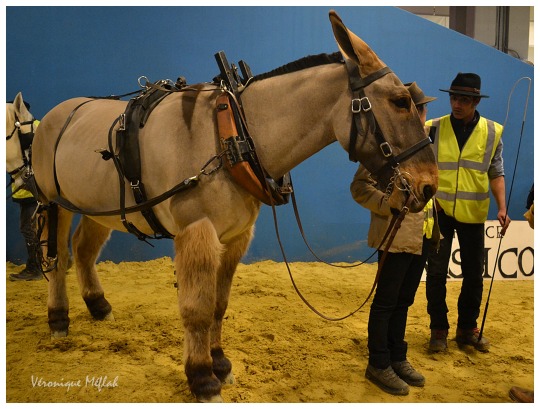


This absolute unit was the must-have work-animal for all kinds of farm and industrial work for centuries, and a significant French export, until mechanisation made these magnificent creatures obsolete.
With no demand for the Poitevin mule , its parent breeds dwindled, almost to the brink of extinction. Determined conservation efforts during the last few decades are slowly bringing their numbers back up, but they're very far from their heyday, when some 20,000 Poitevin mules were born annually.
The Poitevin Mulassier



Both the parent breeds are still endangered, which means most of the current effort is directed into bringing up the numbers of Poitevin horses and Pitou donkeys. This means breeding horses to horses and donkeys to donkeys, with very few breeding opportunities allowed to produce the Poitevin mule. Only about 20 of those are born each year.
The Baudet du Pitou



38K notes
·
View notes
Text


its important to do this every time a museum or school thinks this is a good idea
46K notes
·
View notes
Text
In the town where I grew up, there was a large statue in one of the parks, of a famous historical white colonizer. I'm not going to say who specifically, suffice it to say that it was someone who wasn't worth memorializing for their deeds. And as you can imagine, this statue was a frequent target of vandalism, with paint or toilet paper or eggs on multiple occasions. Now, the local council was generally pretty lax when it came to repairing potholes or other public damage in the town, but every time, 24 hours after this particular statue was hit, the same person would always appear in a Hi-Vis vest, hat, mask and sunglasses, carrying a bucket of water, and wash it clean. They would do it as quickly as possible, but always made sure the face and the name carved at the bottom were generously scrubbed. This only encouraged people to do it again, and so it became a vicious cycle.
Within a year, the statue had sustained so much damage that it was unrecognizable and the lettering unreadable, so eventually the council came and took it down. Also apparently, the person in the Hi-Vis vest didn't even work for the council. They were supposedly just some 'good samaritan' who cleaned it, often before the council even discovered it needed cleaning, so they just let them do it and ignored the problem. They didn't bother putting the statue up again.
Much later, we found out that the anonymous 'samaritan' had been deliberately washing the statue with a bucket of saltwater, which had dramatically corroded it, causing irreversible accumulative damage far worse than spray paint ever would have done. It's even theorized that they were also often the one spray-painting it, just so that they had an excuse to come back after a day to wash it.
200K notes
·
View notes
Text
Grandmas were so right about puzzles and knitting and crocheting and solitaire and reading slow and slippers and baking and watching deer in the backyard send post
214K notes
·
View notes
Text
As a kid, when your parents are poor, you're poor. If they don't have money, that means none of you have money. But if someone's parents are rich, that doesn't necessarily mean the kid is. Sometimes rich peoples' kids aren't rich kids, they're just some rich freak's exotic pets that can talk but aren't allowed to.
33K notes
·
View notes
Text
the fundamental tension between wanting to dissociate modes of dress from gender and people wanting to use modes of dress to signify their gender so they don't have to play the Pronoun Game
42K notes
·
View notes

